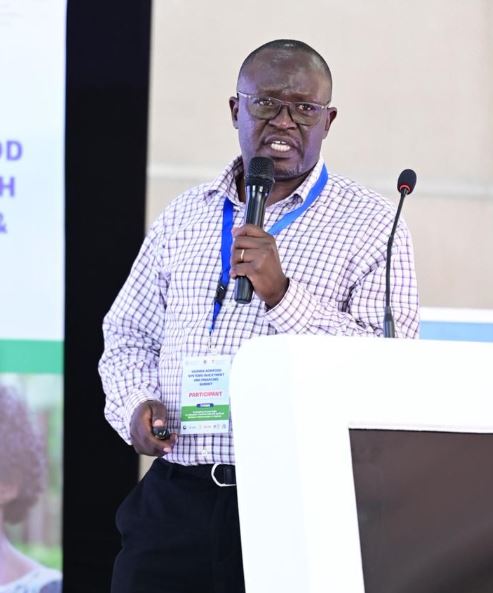
The Uganda Agrifood Systems Investment and Financing Conference, held June 25-26, 2025, at the Kampala Serena Hotel, underscored a vital fact: achieving food security and driving economic growth in Africa is inextricably linked to the full inclusion of women.
During Day Two of the summit, Godfrey Omony, a Senior Technical Advisor at CARE International Uganda, delivered a powerful message, emphasising that although food security is a shared responsibility, with the state leading the charge, its success depends on unlocking the potential of women, because they are often overlooked in economic planning.
Omony noted that while women perform a staggering 70-80% of agricultural labour in Uganda and across Africa, they remain systematically excluded from markets and finance.
According to Omony, “this exclusion is not merely an injustice; it’s a critical impediment to national development, undermining both the Sustainable Development Goal 2 (Zero Hunger) and Uganda’s ambitious Vision 2040 to transform into an upper-middle-income country.”
SDG 2 specifically calls for doubling the agricultural productivity and incomes of small-scale food producers, particularly women, by ensuring their secure and equal access to land, other productive resources, inputs, knowledge, financial services, and markets.
Women’s Undervalued Contribution
Omony stressed that women are the primary food producers, processors, and providers for households in Uganda. He pointed out that women’s roles are prevalent in the entire agricultural value chain, from planting and weeding to harvesting, processing, and bringing produce to local markets. Yet, despite this immense contribution, they consistently face several barriers, some of which include;
Limited Land Ownership
Cultural norms and legal gaps often prevent women from owning or controlling land, limiting their ability to invest in long-term improvements or use land as collateral for loans. In Uganda, as few as 28% of women own agricultural land.
Lack of Access to Finance
Financial institutions often perceive women as higher risk due to lack of collateral or formal credit histories, leading to their exclusion from loans and other financial services. When loans are available, they are often small group loans, limiting the scale of investment women can make.
Restricted Market Access
Omony explained that women farmers often lack direct access to larger, more profitable markets, relying instead on middlemen who offer lower prices. Poor infrastructure and lack of transport further exacerbate this issue.
Limited Access to Information and Technology
He also noted that gender biases in extension services mean women often miss out on crucial training, improved seeds, modern farming techniques, and climate-smart agricultural practices.
Decision-Making Exclusion
Despite their labour, Omony raised concerns that women often have limited say in household financial decisions or agricultural planning, especially concerning cash crops, which often affects their yields and consequently, their earnings.
This exclusion, he asserted, has direct and severe consequences for food security, noting that when women cannot access the resources they need, their productivity suffers, leading to lower yields, reduced incomes, and ultimately, less food available at the household and national levels.
It perpetuates a cycle of poverty and food insecurity, disproportionately affecting women and children who are often the first to suffer from food shortages within households.
CARE International’s Commitment to Inclusion
Omony affirmed that CARE International will leverage these insights to refine its strategies and ensure food is available, accessible, and affordable, especially for women and girls.
CARE’s long-standing work in Uganda focuses on empowering women and girls, recognising them as central to overcoming poverty.
The message from the Agrifood Systems Conference is clear: Uganda’s journey towards food security, sustainable development, and upper-middle-income status will be incomplete without addressing the systemic exclusion of women in its most vital sector.
This requires not just recognition of their labour but deliberate policy actions and investments that champion their financial inclusion, market access, and decision-making power.
This is the pathway to truly transform Uganda’s agrifood system and build a prosperous future for all.
